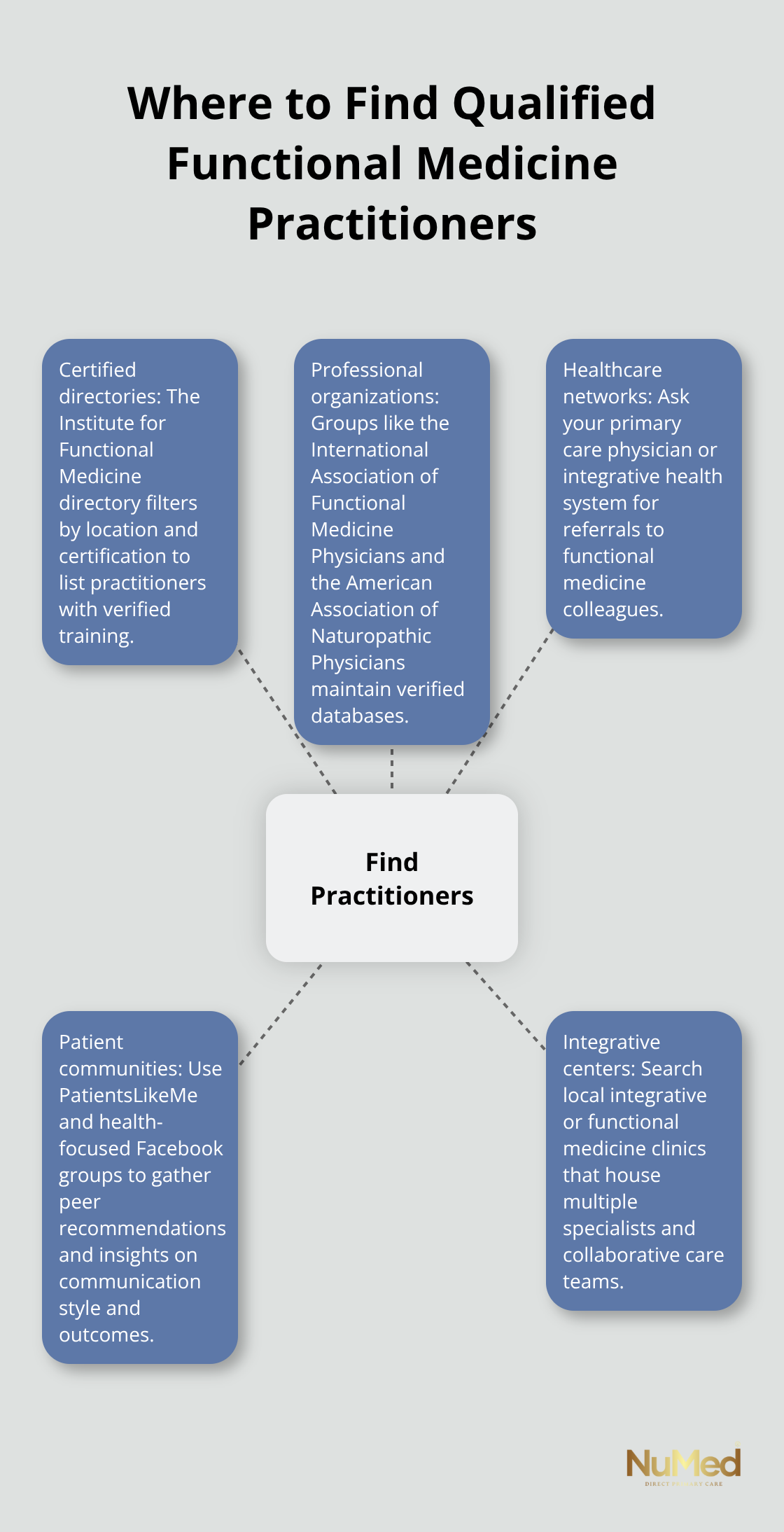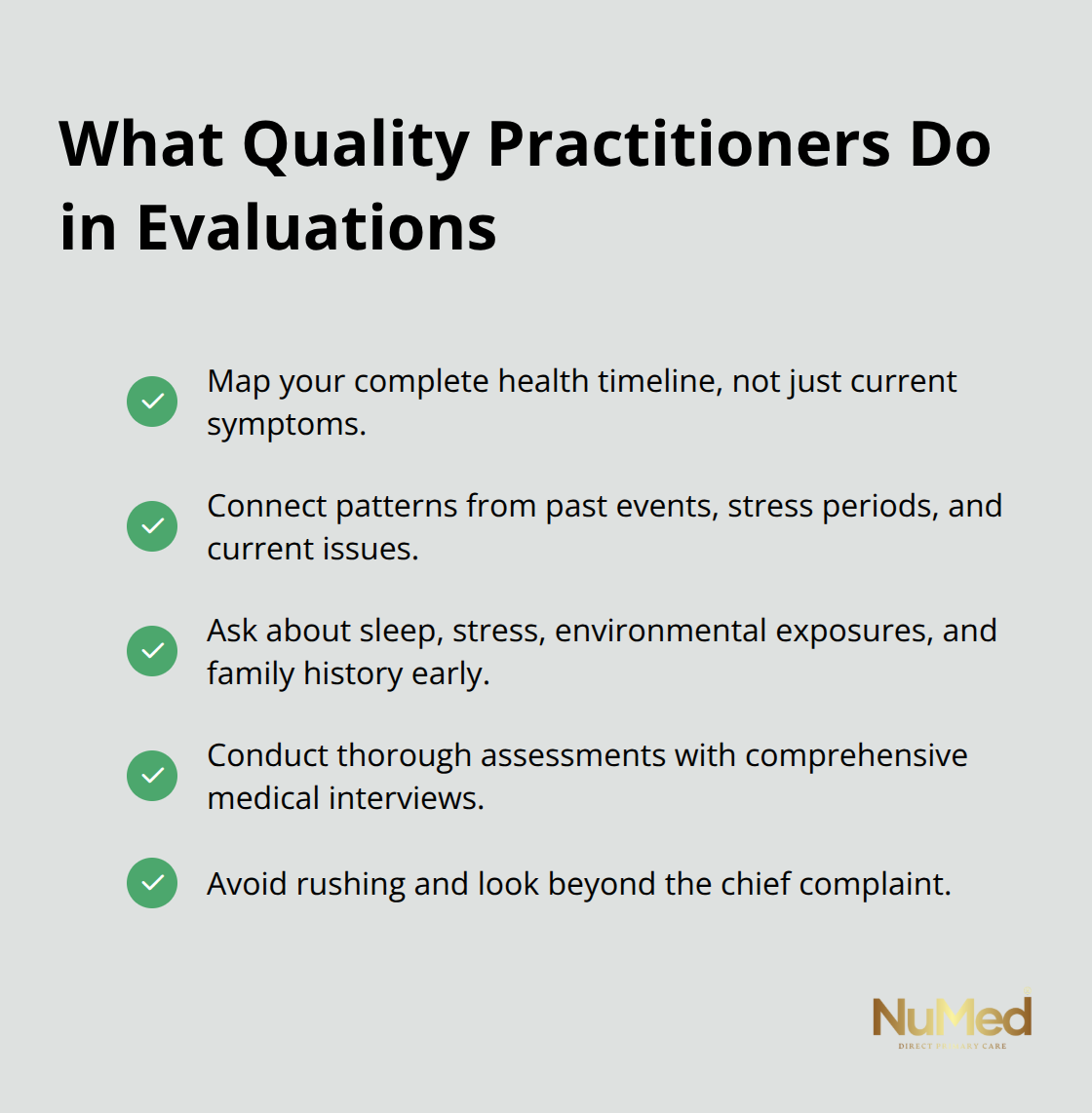Finding the right healthcare provider can transform your wellness journey. Traditional medicine often treats symptoms, but functional medicine practitioners focus on identifying and addressing root causes of health issues.
We at NuMed DPC understand how challenging it can be to find functional medicine practitioners who align with your health goals. The growing demand for personalized healthcare has led to a 65% increase in functional medicine practices over the past five years.

This guide will help you locate qualified practitioners in your area and evaluate their expertise effectively.
Understanding Functional Medicine and What to Look For
Functional medicine practitioners allocate 60-90 minutes for initial consultations, while conventional doctors average just 7 minutes according to the Institute for Functional Medicine. These practitioners view your body as interconnected systems rather than isolated organs. They investigate why you experience digestive issues alongside fatigue, instead of treating each symptom separately. Comprehensive lab panels test for nutrient deficiencies, hormone imbalances, and inflammatory markers that standard doctors often overlook.
Essential Certifications That Matter
The Institute for Functional Medicine certification requires 130 hours of advanced training beyond medical school. Board certification in integrative medicine from the American Board of Integrative Medicine adds credibility to a practitioner’s qualifications. Naturopathic doctors should hold licenses from accredited four-year naturopathic medical schools (not online programs). Practitioners who only completed weekend workshops or online courses lack the depth needed for true functional medicine expertise.
Questions That Reveal Their Approach
Ask potential practitioners how they address gut health, since the intestinal microbiome enhances immune system functionality. Request details about their testing protocols for mycotoxins, heavy metals, and food sensitivities. Inquire about their success rates with conditions similar to yours and ask for specific patient outcome data. Find out if they collaborate with other specialists and whether they provide support between appointments.
Red Flags to Watch For
Practitioners who promise quick fixes or guarantee specific outcomes often lack genuine functional medicine training. Those who refuse to share their credentials or avoid discussing their testing methods raise immediate concerns. Avoid anyone who dismisses conventional medicine entirely or discourages you from working with other healthcare providers.
The next step involves knowing exactly where to find these qualified practitioners in your local area.
Where to Find Qualified Functional Medicine Practitioners
The Institute for Functional Medicine directory contains certified practitioners across North America, which makes it your most reliable starting point. Their website search function filters by location, specialty areas, and certification levels. It shows only practitioners who completed their rigorous training program with over 140 hours of content. The American Board of Integrative Medicine maintains a separate directory of board-certified physicians who blend conventional and functional approaches. These directories eliminate guesswork because they verify credentials before they list practitioners.
Professional Medical Organizations Provide Verified Listings
The International Association of Functional Medicine Physicians lists practitioners who meet specific educational requirements beyond basic certification. Search their database by zip code to find practitioners within a 50-mile radius of your location. The American Association of Naturopathic Physicians directory includes licensed naturopathic doctors who often practice functional medicine principles. Many states require naturopathic physicians to complete four-year medical programs (not online courses), which makes them well-qualified for comprehensive functional medicine care.

Healthcare Networks and Patient Communities Offer Valuable Referrals
Your current primary care physician can refer you to functional medicine colleagues, especially if they work within integrative health systems. Many conventional doctors now recognize functional medicine’s value for complex chronic conditions their standard treatments cannot resolve. Online patient communities like PatientsLikeMe and health-focused Facebook groups share practitioner recommendations from people with similar health challenges. These peer referrals often reveal practitioners’ communication styles, treatment success rates, and appointment availability that directories cannot provide.
Integrative Health Centers House Multiple Specialists
Integrative medical centers typically house multiple functional medicine practitioners under one roof. They offer comprehensive tests and treatment options through collaborative care teams that include nutritionists, health coaches, and specialized therapists who work together on your case. Search for integrative medicine centers, functional medicine clinics, and naturopathic medical centers in your metropolitan area through Google Maps and Yelp reviews (patient feedback reveals important details about wait times and staff responsiveness).
Once you identify potential practitioners, you need specific criteria to evaluate their expertise and approach to patient care.
Evaluating Potential Practitioners
Effective functional medicine practitioners spend their initial consultation to map your complete health timeline, not just current symptoms. They connect patterns between childhood antibiotics, stress periods, and current digestive issues that conventional doctors miss. Watch for practitioners who ask about sleep patterns, emotional stress, environmental exposures, and family health history within the first 30 minutes.

Quality practitioners conduct thorough health assessments that identify multiple contributing factors through comprehensive medical interviews. Practitioners who rush through intake forms or focus only on chief complaints lack the thoroughness functional medicine requires.
Assessment Methods That Show True Expertise
Quality practitioners conduct systematic reviews of your health history across multiple decades. They identify connections between past infections, medication use, and current symptoms through detailed questionnaires. Expert practitioners ask specific questions about digestive patterns, energy fluctuations, and stress responses rather than general wellness inquiries. They document family health patterns and environmental exposures that influence your current health status (including mold exposure, chemical sensitivities, and workplace toxins).
Laboratory Testing Protocols That Matter
Advanced practitioners order comprehensive stool analysis, organic acid tests, and nutrient panels that reveal metabolic dysfunction patterns. They test for mycotoxins, heavy metals, and food sensitivities with validated laboratory methods, not muscle tests or pendulum techniques. Functional medicine laboratories provide comprehensive data that reveals underlying metabolic patterns not captured in standard blood panels. Quality practitioners explain test selection rationale and connect results to your symptoms through biochemical pathways. Avoid practitioners who order excessive tests without clear justification or rely on unvalidated methods that lack scientific backing.
Patient Outcomes That Demonstrate Real Results
Request specific success rates for conditions similar to yours, with treatment duration and patient satisfaction scores. Established practitioners track patient progress through validated questionnaires and biomarker improvements over 6-12 month periods. Research shows that patients commonly report improvements in functional neurological symptoms, emotional well-being, and achievement of treatment goals through comprehensive functional medicine approaches. Review online testimonials for detailed recovery stories that mention specific symptoms, treatment approaches, and timeframes rather than vague positive statements (look for concrete details about energy improvements, digestive healing, or pain reduction). Practitioners who cannot provide concrete outcome data or refuse to share patient success metrics often lack the experience needed for complex health challenges. Consider practitioners who integrate mental health coaching approaches alongside physical treatments, especially for women’s wellness concerns that require comprehensive care strategies.
Final Thoughts
Your search to find a functional medicine practitioner requires a systematic evaluation of credentials, testing methods, and patient outcomes. Start with the Institute for Functional Medicine directory for certified practitioners with verified training. Schedule consultations with 2-3 candidates to compare their approaches and communication styles.
Avoid practitioners who promise quick fixes, refuse to share credentials, or dismiss conventional medicine entirely. Red flags include excessive tests without a clear rationale, unvalidated diagnostic methods, and an inability to provide concrete patient outcome data. Quality practitioners demonstrate transparency about their methods and track measurable patient improvements over time.
Success in functional medicine depends on practitioners who address root causes through comprehensive tests and personalized treatment plans. We at NuMed DPC combine functional medicine principles with direct primary care to provide accessible healthcare that focuses on prevention. Your functional medicine journey requires patience and commitment to lifestyle changes alongside targeted treatments (track your progress through symptom journals and follow-up tests to measure improvements over 6-12 months).
















